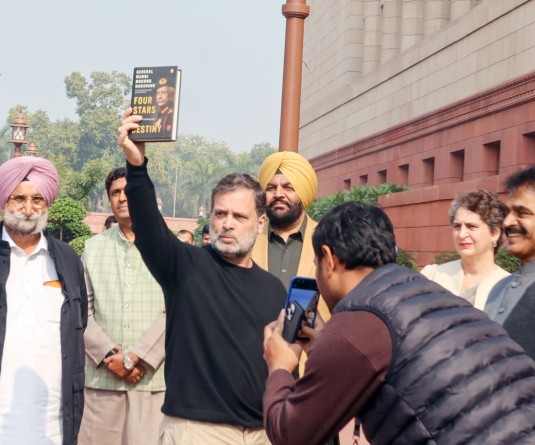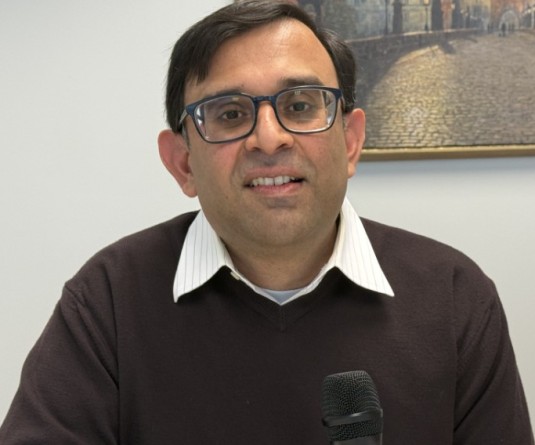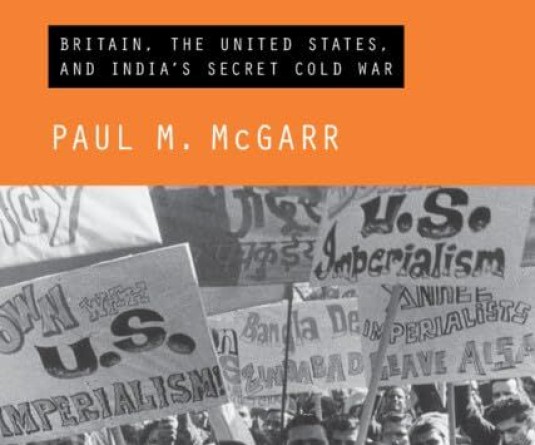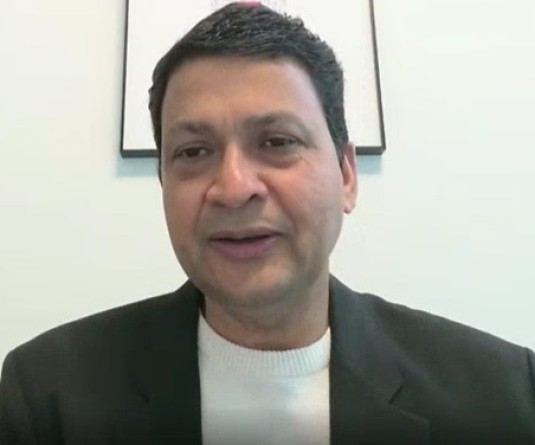It is good India is a 'Union' of states
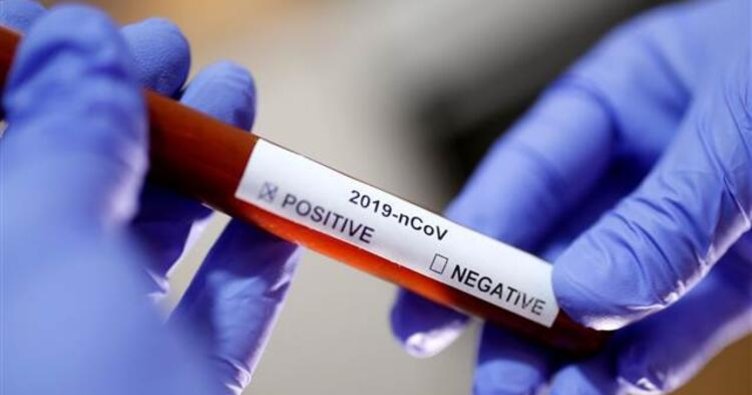
BY D.C. PATHAK
IANS | April 5
The episode of corona virus infliction that embraced most Indian states, tested the strength of our federal architecture in a manner that was entirely new -- for the first time the whole population of India was exposed to a shared threat to life without the distinction of caste, creed and region making it imperative for the states to completely fall in line behind the Centres decision of a total lockdown to protect all citizens.
This call for a united defence against an ‘invisible' enemy --whose attacks could neither be ‘pointed' for their location nor ‘predicted' -- went far beyond even the experience of dos and don'ts that the people faced in a situation of ‘war' in the past. Corona pandemic illustrated the merit of India being a Union of states whose Constitution had bestowed on the Centre all the residuary powers as well as the exclusive right of strategic decision-making in regard to the protection of national well- being and the safeguarding of national security.
The Centre -- symbolising the ‘national resolve'-- led the fight against the threat of corona virus and mandated the states on what they would do or not do during the lockdown. The Centre had to decide about the movement of people across the country, define the essential services and the conduct of trade and commerce and determine the role of various institutions in the states. The long and total lockdown ordered by the Centre was ‘like a curfew' promulgated throughout the length and breadth of the country and implemented without declaration of any national ‘Emergency'.
One weak point of enforcement that surfaced during the lockdown was the handling of the ‘reverse migration' that saw thousands of workers with their families pouring out on the streets in their desperate bid to reach their home villages, after ‘losing' their jobs. This part of the responsibility fell on the states who apparently did not read the situation well and ran into some difficulty in dealing with the large humane task of conducting the migrants safely to their destination or putting them in camps -- without compromising the ‘social distancing' norms. When the states moved after a goading from the Centre, the enormous bureaucracy at their command seemed to be not sure of how to deal with the state's own people under the lockdown. Interestingly the case of a health worker extending the disinfection spray meant for the roads, to a crowd of stranded migrant labour and their families, brought out two crucial points -- one, the worker took a well-intentioned decision at his level but he did not have the benefit of an organised briefing from above and two, somewhere the authorities in India had not completely shed the colonial outlook while dealing with ‘ordinary' people.
The corona episode tested our senior administrators on the ground or at the helm of the state machinery for their decision-making power that defines leadership. Organising transport, fixing camp accommodation or arranging supply of food as an immediate necessity for stranded citizens seemed to have become a difficult proposition for them in a situation of emergency. Apparently, there was a tendency to leave everything on the shoulders of policemen on the road. Many officials, however, did perform well and this helped ultimately to deal with the large turnout of migrants.
There is a case for India enhancing its role as a Unitary State in the matter of getting people of proven merit to man top positions in administration and the police in the states. What the country also needs -- and this a Unitary outlook can provide more easily -- is the restoration of the district administration as the hallmark of the ‘steel frame' that it once was before being steadily eroded after Independence. District is the effective administrative unit closest to where the people lived and it should be put in charge of selected officers of the IAS and IPS who should come under the Centre's broad oversight for performance evaluation in addition to the control that the state government to which they were allocated, had on them. Some movement in this direction is necessary also for the reason that all projects of the state and the Centre ultimately find their fruition in the district jurisdiction. The Collector-SP duo should be a natural part of the monitoring of these projects for the good of the country. This had not happened evidently because the decline of integrity in public life had created in the past an environ of permissiveness in which the function of supervision had been destroyed and politicians were able to prevail over the local administration.
The 21-day lockdown implemented with administrative vigour -- top down -- was the best response the Modi government could produce in a vast populous country like India that was vulnerable to the threat of corona virus traversing across geographical frontiers between China, Europe, US, West Asia and the Indo-Pacific. Considering that the virus molecules were like free floating droplets in the air but also widely berthing on surfaces on touch for certain durations -- ready to mutate and multiply on soft human tissue of the respiratory system -- the lockdown declaration was in line with scientific logic and had to be ‘enforced' because of the vast differential of knowledge and literacy existing in India. The Centre was prompt in rushing financial aid to the poor and the needy.
Meanwhile, an illustration of how people disregarded the danger -- out of defiance rooted in ignorance -- was provided by the Tablighi Jamaat leaders of Delhi who organised a large international Ijtema at Nizamuddin in the midst of the corona crisis when the government had already cancelled all large social events invoking the epidemic disease law. It is known that Tablighi Jamaat represents a world movement promoting the spread of puritan Islam amongst Muslims. Tabligh preachers in groups are on the move internationally all the year long telling the Muslims to shed all un-Islamic practices they had acquired under the influence of Hindu or other cultures.
The question here is about the reason why the Tabligh headquarters in Delhi did not cancel the Ijtema on its own and had to be persuaded to cooperate in a top level intervention made by the National Security Advisor himself. Delhi government has now recommended criminal prosecution -- in this a point of enquiry would be to find out if at the congregation the speakers talked of superiority of ‘faith' over the directives of the government. In a multi-religious country like India, the corona pandemic has re-established the principle that in the face of a national disaster there cannot be a community-specific line of response standing apart from the policy of the regime. This is the recipe of secular governance. Government will have to watch out against any attempts by hostile elements within and outside the country to exploit the Tablighi Jamaat congregation controversy on communal lines and make it a Muslim issue.
The long-range impact of the pandemic that has jolted all nations, would be analysed and assessed. For India, three trends can be considered inescapable. First, revival of indigenous economy will catch up but the focus will also be on improving the productivity of our public sector which had not covered itself with glory and also on the health and hospital infrastructure of the country that had remained woefully inadequate. Secondly, a boost for online services from retail to tele-medicine is on the cards as also a transformative upgrade of ‘distance learning' in the context of our school and university education. The third is the likelihood of people demanding a new level of efficiency from our machinery of governance -- they are wiser now about the strengths and inadequacies of the responses of the authorities seen in various parts of the country during this crisis. This will become an important point of judgement for the people. On the positive side, an undercurrent is already there of the new awareness among Indians that ‘we all must swim or sink together'. Prime Minister Modi's pro-active handling of a national contingency was timely enough -- and this has certainly helped India. What happened elsewhere in the world would create a strong sentiment in the country of seeking ‘safety at home' and add to the sense of national unity.
In the backdrop of optimistic readings of experts about the effectiveness of the 21-day lockdown in India in mitigating the danger of ‘community spread' of the corona virus, Prime Minister Modi took the initiative of reaching out to the Chief Ministers again through tele-conferencing on April 2 to review the future course of action. He instructed them not to revert to ‘business as usual' but evolve a properly staggered ‘exit strategy' in the event of the Centre deciding not to extend the lockdown. Restoring freedom of movement had to be in keeping with the dos and don'ts of ‘social distancing' that would be required for the near future. In normal times, movements take place for the purposes of work, shopping, entertainment, medical care and education and these have to be self regulated in a manner that made sense. Movement for getting back to work, seeking medical help and purchasing essential commodities should get priority. Use of public transport needed for all activities will have to be given particular attention since crowding cannot be allowed.
Whatever is decided by the Centre, the nation is assured of a pro-active handling of the crisis by a fully committed Prime Minister and his team. The Prime Minister, in a special message to the people, has called upon all households to switch off electricity and light a lamp or candle for a few minutes on Sunday night -- April 5, 9 pm -- to create a feeling at the national level that ‘no one was alone' in this crisis. This is an effective remedy for dealing with the mass psychology that was taking a hit because of the lockdown. After the PM's call, people of India hopefully will feel further strengthened about meeting their share of responsibility at this moment.
(The writer is a former Director Intelligence Bureau)


